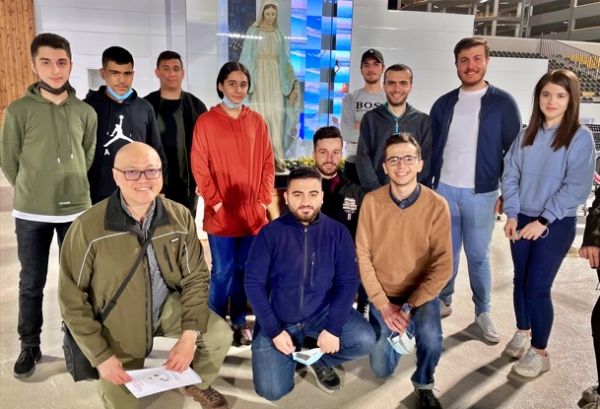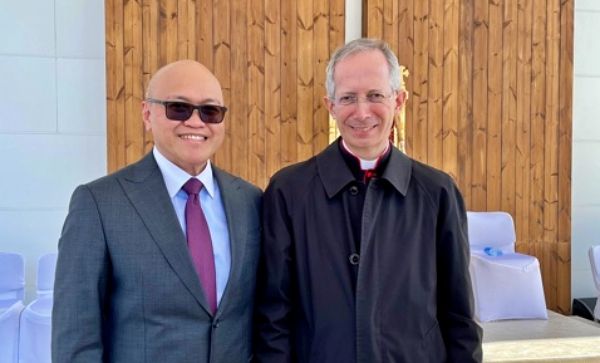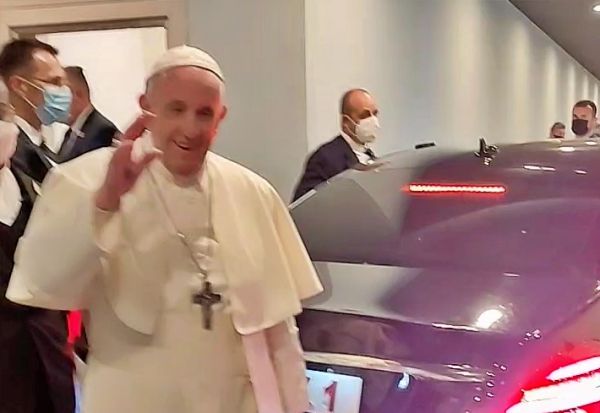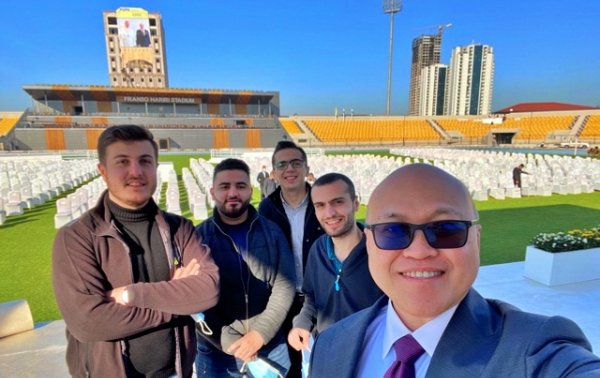When last December I heard the Vatican announcement of Pope Francis’ planned visit to Iraq in March 2021, my first thoughts were that the Iraqi Christians, more than any other people, greatly deserved this fatherly accompaniment by the Vicar of Christ. The visit included Erbil as a venue for a Papal Mass.
I am a Filipino, a member of Opus Dei, and have been working as an expat in Erbil for 6 years now. I was Safety and Quality Assurance Manager for a ground handler at the Erbil International Airport in 2015-2019. I am now Project Manager for the International Relations Office of the Chaldean Archdiocese of Erbil. One of my responsibilities is to monitor funding support from major global humanitarian organizations aimed at preserving Christianity in Iraq so that, as described by His Holiness, the Martyr Church may not just survive but thrive.

Witnessing firsthand the devotion of the Christian families to their Aramaic (Chaldean) tradition has been very inspiring for me. People here would often mention in any conversation that Christianity was present in Iraq since Pentecost 2,000 years ago.
My friends in Erbil were skeptical that a visit from the Holy Father would ever take place. I understood their pessimism as Iraqis have experienced so many conflicts: wars with neighboring countries, bombings, genocide, the US invasion and economic embargoes, etc. The persecution of Christians and other minorities reached a climax with the 3-year reign of ISIS in 2014-2017.
The Christian population of Iraq has declined greatly, and now numbers less than 150,000. The figure continues to dwindle as Christian families are forced to emigrate. The economy is in crisis, with unemployment at 70%.
But for now, the Pope was coming. I considered myself privileged to be here at this time to celebrate with the Christians of this blessed land this historic event.
I prayed for a safe and successful visit and for its abundant spiritual fruits. Also, I hoped and prayed that I would get a chance to personally meet Pope Francis. This was far-fetched of course. The meetings with religious and civil authorities, and the audiences of all the indigenous Catholic denominations – Syriac, Chaldean, Assyrians – had to fit within the tight schedule of the 3-day visit.

In the weeks preceding the date for the visit, we experienced a surge of infections from the new Covid-19 variant; there were twin suicide bombings in Baghdad; and missiles were fired at residential areas and military bases in Erbil. Three days before the visit, rocket attacks in Baghdad killed a civilian and injured many others. The people’s mood shifted from enthusiasm to anxiety.
Amid all these problems, the Pope confirmed in a general audience two days before his flight that there was no backing out. He was going because the Iraqi Christians have waited such a long time for this visit.
Five days before the visit, Fr. Nashwan, a Chaldean priest who is a friend of mine and the choirmaster for the Papal Mass, approached me to ask several things about the Latin rite of the Holy Mass. To my great surprise, he asked me to lead the altar servers for the Pope’s Mass as they were familiar only with the Chaldean rite. I was ecstatic and prayed a ‘Te Deum’ right there and then for my rapidy answered prayer.
St. Josemaria always taught us to serve the Church as the Church wants to be served. I am a professional and no liturgy expert, but willing to learn if it is to serve the Holy Father and the Church in Iraq.
I immediately got in touch with Fr. Vic Santos in Manila, who helped me learn the sequence, procedures and movements for the servers. He emailed me materials to study regarding the ceremonies, which greatly calmed my nerves.
March 7 was the date for the Mass in Erbil. We rehearsed in the morning with Monsignor Marini, the person in charge of liturgical ceremonies for the Pope. Another Chaldean priest friend, Fr. Janan, introduced me: “This is Lito. He is the leader of the altar servers; he is a member of Opus Dei.” Msgr. Marini gestured with a sign of approval, “Sopra Perfetto!” (Super Perfect!). I just bowed in humility and thanked God for this.

The altar servers and priests lined up for the Pope’s entry into the sacristy at 4:00 p.m. We were told that all would have a chance to greet the Pope individually. Msgr. Marini pulled me out of the line and positioned me by the entry of the room where the Holy Father was to put on his vestments for the Mass.
Pope Francis arrived and shook hands with each one in line. As he was drawing closer, things got surreal for me and I was at a loss for words. Then, I was face to face with the Holy Father. He shook my hand, and the only thing I could utter was: “Su Santidad, I am Carmelito, a Filipino.” His eyes gleamed with joy. I kissed his hands and he entered the room to vest. The ceremony proceeded and things went well.
After the Mass, the altar servers and I were again at the doorway where the Holy Father was to enter to remove his Mass vestments. This time I gathered myself and was more composed. Meeting him I said, while holding his right hand, “Thank you very much your Holiness. I am Carmelito, a Filipino, I am an associate member of Opus Dei. I pray and offer sacrifices every day for you. The Opus Dei center in Beirut awaits your visit to Lebanon. The faithful of Opus Dei in Lebanon and in the Philippines send you their love.” His eyes gleamed once more with joy and he said, “Yes, yes, yes!”
I gathered the altar servers once more at the hallway where the Holy Father was to board his car. We cheered repeatedly: “Viva il Papa… Viva il Papa!” He acknowledged our greetings with a wave and a smile. We were more than happy with that last expression of gratitude for his altar servers.

